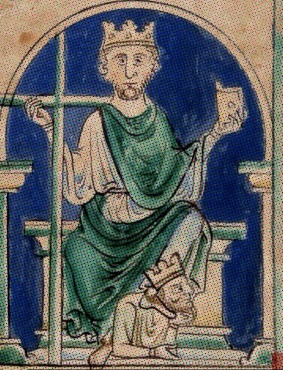St Oswald of Northumbria

King and martyr, Oswald was the son of Ethelfrith, king of Northumbria. When Edwin seized the kingdom in 616, he fled to Scotland with his family and became a Christian at Iona. When Edwin died in 633, the royal exiles returned to Northumbria. Oswald's brothers, Osric and Eanfrid, were killed by the tyrannical British king Cadwalla. Although he had a much smaller army, Oswald beat Cadwalla's forces at a battle near Hexham. Cadwalla was killed.
Few of Oswald's subjects then were Christian. When peace was restored, he sent for a bishop to preach the Gospel. The first man who came was critical and strict and made no headway. He was soon replaced by the kindly St Aidan. Oswald interpreted his sermons and gave him the island of Lindisfarne for a monastery and episcopal seat near the royal residence of Bamburgh.
Under St Oswald's rule, peace was restored in Northumbria and good relations developed with the Anglo Saxon kings. He married Cyneburga, daughter of the King of Wessex. But his reign did not last long. After only eight years St Oswald was killed by the pagan king Penda of Mercia at the battle of Maserfield. He was just 38. As he was dying, he prayed for the souls of his bodyguards who died with him. His body was dismembered and sacrificed to the god Woden in a pagan ritual.
His remains and relics were moved many times around the country. His skull was said to have been discovered in the tomb of St Cuthbert in 1827. Many miracles were attributed to them. Seventy churches are dedicated to him in England and there are many in Portugal, Bohemia, Holland, Germany, Austria and Switzerland. St Oswald was celebrated for his heroism, his generosity and his piety.












